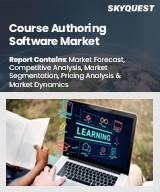
|
시장보고서
상품코드
1834196
E-Learning IT 인프라 시장 : 구성요소, 전개 모델, 조직 규모, 최종사용자 업종별 - 세계 예측(2025-2032년)eLearning IT Infrastructure Market by Component, Deployment Model, Organization Size, End User Vertical - Global Forecast 2025-2032 |
||||||
E-Learning IT 인프라 시장은 2032년까지 CAGR 8.55%로 4,727억 달러로 성장할 것으로 예측됩니다.
| 주요 시장 통계 | |
|---|---|
| 기준 연도 2024년 | 2,451억 6,000만 달러 |
| 추정 연도 2025년 | 2,665억 8,000만 달러 |
| 예측 연도 2032 | 4,727억 달러 |
| CAGR(%) | 8.55% |
전략적 입문서는 가장 영향력 있는 인프라 세력의 프레임워크를 설정하고, 기술 선택과 경영진의 운영 및 거버넌스 우선순위를 일치시키는 전략적 입문서입니다.
서론에서는 가속화되는 기술 혁신과 진화하는 규제 압력 속에서 IT 인프라 전략을 수립하는 경영진을 위해 그 배경을 정리하고 있습니다. 이 소개서는 모든 개발 동향을 나열하는 것이 아니라, 기업 인프라를 재구성하는 가장 중요한 힘을 추출하고, 민첩성, 탄력성 및 운영 보안을 유지하기 위해 경영진이 채택해야 할 우선순위를 정리하고 있습니다. 이 책은 전략적 의도와 벤더 선택, 도입 모델, 조직 투자에 영향을 미치는 현실적인 트레이드오프를 연결하여 명확성을 강조합니다.
이 책은 네트워크, 보안, 서버, 스토리지와 같은 컴포넌트 레벨의 의사결정과 클라우드 및 온프레미스 아키텍처에 대한 상위 선택과의 상호 작용을 강조합니다. 또한, 조직의 규모와 수직적 요구사항이 조달 기준과 운영 태세를 어떻게 변화시키는지 강조하고 있습니다. 상호운용성, 자동화, 데이터 주권과 같은 횡단적 주제를 강조함으로써 독자들이 환경 변화, 관세, 세분화 인사이트, 지역 역학, 벤더 전략, 권장 행동 등을 검토하는 후속 섹션을 해석할 수 있도록 준비합니다.
마지막으로, 인트로는 실용적인 방향을 제시합니다. 즉각적인 의사결정을 지원하기 위한 인사이트를 제공하는 한편, 기술 및 정책 환경의 변화에 따라 지속적인 재평가의 필요성도 인정하고 있습니다. 그 목적은 리더에게 기술적 선택과 비즈니스 목표 및 거버넌스 필수 사항을 일치시킬 수 있는 간결한 전략적 렌즈를 제공하는 것입니다.
인프라 아키텍처, 조달 선택, 거버넌스 모델을 빠르게 재구성하고 있는 기술 동향과 규제 동향에 대한 심층적인 조사
분산 컴퓨팅 아키텍처의 급속한 발전, 사이버 보안 위협의 확산, 기업의 민첩성에 대한 기대치의 변화로 인해 인프라 환경은 크게 변화하고 있습니다. 엣지 및 하이브리드 도입이 성숙해지면서 중앙집중식 제어와 로컬 처리 사이에 미묘한 트레이드오프가 발생하고 있습니다. 그 결과, 네트워킹 아키텍처는 더 큰 동서 트래픽을 지원해야 하고, 보안 제어는 전체 환경에 통합되어야 하며, 서버 및 스토리지 설계는 복합화 및 소프트웨어 정의 관리에 중점을 두어야 합니다.
동시에 자동화 및 오케스트레이션 솔루션은 인프라 프로비저닝 및 보안 확보 속도를 가속화하고 있습니다. Infrastructure-as-Code 패러다임과 정책 기반 프로비저닝은 일관되고 반복 가능한 배포를 가능하게 하지만, 구성 드리프트와 보안 격차를 피하기 위한 기술과 거버넌스 프레임워크에 대한 투자도 필요합니다. 또한, 컨테이너화 및 마이크로서비스 도입이 증가함에 따라 네트워킹 성능과 스토리지 아키텍처에 대한 새로운 요구사항이 생겨나면서 전통적인 모놀리식 서버 배치에 대한 재평가가 이루어지고 있습니다.
규제와 지정학적 움직임도 변화의 계기가 되고 있으며, 기업들은 데이터 레지던시 및 공급망 의존성을 재검토해야 하는 상황에 직면해 있습니다. 현재 조달팀은 벤더의 다양성, 컴포넌트의 실증성, 라이프사이클 지원의 균형을 고려하고 있습니다. 이에 대응하기 위해 리더들은 구성요소 교체 및 멀티 벤더 상호운용성을 용이하게 하는 모듈식 아키텍처를 우선시하고 있습니다. 이러한 트렌드를 종합해 보면, 보다 역동적이고 탄력적이며 정책을 의식한 인프라 환경이 구축되고 있으며, 기술, 조달, 컴플라이언스 등 다양한 기능을 아우르는 통합적인 계획이 필요하게 되었습니다.
2025년 관세 전환이 어떻게 조달의 복잡성, 공급망 혼란, 인프라 카테고리 전반에 걸친 전략적 공급업체 다각화 압력을 증폭시켰는지 분석합니다.
2025년 관세 변경의 누적적 영향은 IT 인프라의 조달 전략과 공급망 계획에 새로운 복잡성을 가져왔습니다. 관세 인상과 분류 규칙의 변경은 네트워킹, 보안 어플라이언스, 서버, 스토리지 하드웨어의 비용에 영향을 미치고, 조달팀은 조달 전략과 총소유비용의 역학을 재검토할 필요가 있습니다. 동시에 공급업체가 관세의 영향을 줄이기 위해 물류 및 경로를 조정하여 배송 타이밍과 예측 가능성에도 영향을 미쳤습니다.
이러한 역학관계로 인해 바이어들은 공급업체 세분화를 강화하고, 수입 대체, 니어쇼어링, 현지 조립과 같은 대체 이행 모델을 모색하게 되었습니다. 이러한 적응은 일률적이지 않고, 대기업은 규모와 장기 계약을 활용하여 완화책을 협상했지만, 중소기업은 가격 변동과 리드타임의 변동에 크게 노출되어 있습니다. 클라우드 중심의 조달은 자본 비용을 운영 소비로 돌림으로써 직접적인 관세의 영향을 어느 정도 흡수했지만, 온프레미스 투자는 하드웨어 관세와 수입 규제의 영향을 더 직접적으로 받는 것으로 나타났습니다.
관세 환경은 직접적인 비용에 대한 영향뿐만 아니라, 부품의 다양성과 벤더의 탄력성을 둘러싼 전략적 논의를 가속화했습니다. 바이어들은 점점 더 공급망의 투명성과 장기적인 지원 약속에 대한 명확한 약속을 요구하고 있습니다. 그 결과, 리스크 관리는 관세 변동에 대한 시나리오 기반 계획을 수립하고, 적절한 경우 계약상 보호, 대체 조달, 재고 헤징에 중점을 두는 방향으로 진화했습니다. 이러한 적응을 통해 조직은 인프라 투자를 장기적인 전략적 우선순위와 일치시킬 수 있는 유연성을 유지하면서 업무의 연속성을 유지할 수 있게 되었습니다.
부문별 인사이트를 통해 구성요소, 전개 모델, 조직 규모 및 수직적 수요가 어떻게 조달 및 아키텍처 결정을 주도하는지를 파악할 수 있습니다.
부문 수준의 인사이트는 구성요소, 전개 모델, 조직 규모, 최종사용자 업종에 따라 조달, 설계, 운영 우선순위에 영향을 미치는 차별화된 요구사항과 채택 패턴을 파악할 수 있습니다. 구성요소를 기준으로 네트워크, 보안, 서버, 스토리지 분야로 시장을 조사했으며, 이러한 세분화를 통해 네트워크 투자 결정에 있어서는 저지연, 소프트웨어 정의 패브릭이 점점 더 우선순위가 높아지고, 보안 평가에 있어서는 통합 텔레메트리와 제로 트러스트 제어가 중요해지고 있음을 알 수 있습니다. 그리고 제로 트러스트 제어가 보안 평가에서는 통합 텔레메트리와 제로 트러스트 제어가 강조되고 있는 것으로 나타났습니다. 서버 평가에서는 모듈화와 워크로드 특화 가속화를, 스토리지 전략에서는 데이터 라이프사이클 관리와 고성능 시스템과 용량 중심 시스템 간의 계층화를 중요시합니다.
목차
제1장 서문
제2장 조사 방법
제3장 주요 요약
제4장 시장 개요
제5장 시장 인사이트
제6장 미국 관세의 누적 영향 2025
제7장 AI의 누적 영향 2025
제8장 E-Learning IT 인프라 시장 : 구성요소별
- 네트워킹
- 보안
- 서버
- 스토리지
제9장 E-Learning IT 인프라 시장 : 전개 모델별
- 클라우드 기반
- 온프레미스
제10장 E-Learning IT 인프라 시장 : 조직 규모별
- 대기업
- 중소기업
제11장 E-Learning IT 인프라 시장 : 최종사용자별
- BFSI
- 교육
- 정부
- 헬스케어
- 병원
- 의약품
- 소매
- 오프라인 소매
- 온라인 소매
제12장 E-Learning IT 인프라 시장 : 지역별
- 아메리카
- 북미
- 라틴아메리카
- 유럽, 중동 및 아프리카
- 유럽
- 중동
- 아프리카
- 아시아태평양
제13장 E-Learning IT 인프라 시장 : 그룹별
- ASEAN
- GCC
- EU
- BRICS
- G7
- NATO
제14장 E-Learning IT 인프라 시장 : 국가별
- 미국
- 캐나다
- 멕시코
- 브라질
- 영국
- 독일
- 프랑스
- 러시아
- 이탈리아
- 스페인
- 중국
- 인도
- 일본
- 호주
- 한국
제15장 경쟁 구도
- 시장 점유율 분석, 2024
- FPNV 포지셔닝 매트릭스, 2024
- 경쟁 분석
- Moodle Pty Ltd
- Instructure Inc.
- Blackboard Inc.
- D2L Corporation
- Cornerstone OnDemand, Inc.
- SAP SE
- Adobe Inc.
- Oracle Corporation
- Docebo S.p.A.
- Epignosis LLC
The eLearning IT Infrastructure Market is projected to grow by USD 472.70 billion at a CAGR of 8.55% by 2032.
| KEY MARKET STATISTICS | |
|---|---|
| Base Year [2024] | USD 245.16 billion |
| Estimated Year [2025] | USD 266.58 billion |
| Forecast Year [2032] | USD 472.70 billion |
| CAGR (%) | 8.55% |
A strategic primer that frames the most consequential infrastructure forces and aligns technical choices with executive-level operational and governance priorities
The introduction establishes context for executive readers who are steering IT infrastructure strategy amid accelerating technological change and evolving regulatory pressures. Rather than cataloguing every development, this introduction distills the most consequential forces reshaping enterprise infrastructure and frames the priorities that executives must adopt to preserve agility, resilience, and operational security. It places a premium on clarity, connecting strategic intent with the practical trade-offs that influence vendor selection, deployment models, and organizational investment.
This narrative foregrounds the interplay between component-level decisions-spanning networking, security, servers, and storage-and higher-order choices about cloud and on-premise architectures. It underscores how organizational size and vertical requirements alter procurement criteria and operational readiness. By highlighting cross-cutting themes such as interoperability, automation, and data sovereignty, the introduction prepares readers to interpret subsequent sections that examine landscape shifts, tariffs, segmentation insights, regional dynamics, vendor strategies, and recommended actions.
Finally, the introduction signals a pragmatic orientation: insights are presented to support immediate decision-making while acknowledging the need for continuous reassessment as technology and policy environments evolve. The goal is to equip leaders with a concise strategic lens that aligns technical options with business objectives and governance imperatives.
A detailed exploration of the converging technological and regulatory trends that are rapidly reshaping infrastructure architectures, procurement choices, and governance models
The infrastructure landscape is undergoing transformative shifts driven by rapid advances in distributed computing architectures, pervasive cybersecurity threats, and changing expectations for enterprise agility. Edge and hybrid deployments are maturing, resulting in nuanced trade-offs between centralized control and localized processing. As a result, networking architectures must support greater east-west traffic, security controls must be embedded across environments, and server and storage designs must emphasize composability and software-defined management.
Concurrently, automation and orchestration solutions are accelerating the pace at which infrastructure is provisioned and secured. Infrastructure-as-code paradigms and policy-driven provisioning enable consistent, repeatable deployments, but they also require investments in skills and governance frameworks to avoid configuration drift and security gaps. Moreover, the increasing adoption of containerization and microservices places new demands on both networking performance and storage architectures, prompting a re-evaluation of traditional monolithic server deployments.
Regulatory and geopolitical dynamics are catalyzing shifts as well, compelling organizations to reassess data residency and supply chain dependencies. Procurement teams now balance considerations of vendor diversity, component provenance, and lifecycle support. In response, leaders are prioritizing modular architectures that facilitate component substitution and multi-vendor interoperability. Taken together, these trends are creating a more dynamic, resilient, and policy-aware infrastructure environment that requires integrated planning across technology, procurement, and compliance functions.
An analysis of how 2025 tariff shifts have compounded procurement complexity, supply chain dislocation, and strategic supplier diversification pressures across infrastructure categories
The cumulative impact of tariff changes in 2025 has introduced new layers of complexity to procurement strategies and supply chain planning for IT infrastructure. Increased duties and shifting classification rules have affected costs across networking, security appliances, servers, and storage hardware, prompting procurement teams to revisit sourcing strategies and total cost of ownership dynamics. In tandem, timing and predictability of deliveries were affected as suppliers adjusted logistics and routing to mitigate tariff exposure.
These dynamics encouraged buyers to intensify supplier segmentation and to explore alternative fulfillment models, including import substitution, nearshoring, and localized assembly. Such adaptations were not uniform; larger enterprises leveraged scale and long-term contracts to negotiate mitigation measures, while small and medium organizations faced greater exposure to price volatility and lead-time variability. Across deployment models, cloud-centric procurement absorbed some immediate tariff impact by shifting capital expenses toward operational consumption, while on-premise investments remained more directly exposed to hardware duties and import regulations.
Beyond immediate cost implications, the tariff environment accelerated strategic conversations around component diversity and vendor resilience. Buyers increasingly sought clarity on supply chain transparency and long-term support commitments. As a result, risk management practices evolved to incorporate scenario-based planning for tariff changes, emphasizing contractual protections, alternative sourcing, and inventory hedging where appropriate. These adaptations helped organizations preserve operational continuity while maintaining the flexibility to align infrastructure investments with longer-term strategic priorities.
Segment-specific insights that decode how components, deployment models, organizational scale, and vertical demands uniquely drive procurement and architecture decisions
Segment-level insights reveal differentiated requirements and adoption patterns that influence procurement, design, and operational priorities across components, deployment models, organization size, and end-user verticals. Based on Component, the market is studied across Networking, Security, Servers, and Storage, and this segmentation highlights that networking investment decisions increasingly prioritize low-latency, software-defined fabrics while security assessments focus on integrated telemetry and zero-trust controls. Server evaluations emphasize modularity and workload-specific acceleration, whereas storage strategies weigh data lifecycle management and tiering between high-performance and capacity-oriented systems.
Based on Deployment Model, the market is studied across Cloud Based and Onpremise, and organizations are balancing the flexibility and operational simplicity of cloud consumption against the control and data residency advantages of on-premise deployments. The choice between these models is shaped by workload criticality, compliance mandates, and cost structure preferences. Based on Organization Size, the market is studied across Large Enterprise and Small And Medium Enterprise, and large enterprises tend to pursue multi-vendor, multi-site architectures with centralized governance, while small and medium organizations often prioritize turnkey solutions and managed services that reduce internal operational overhead.
Based on End User Vertical, the market is studied across Bfsi, Education, Government, Healthcare, and Retail with Healthcare further studied across Hospitals and Pharmaceuticals and Retail further studied across Offline Retail and Online Retail, and each vertical manifests distinct priorities. Financial services emphasize ultra-low latency and robust encryption; education focuses on scalability and remote access; government stresses security compliance and long-term supportability; hospitals require stringent uptime, privacy controls, and clinical data integration; pharmaceuticals combine secure research compute with regulated data workflows; offline retail centers on point-of-sale resilience and inventory synchronization, while online retail emphasizes scalable web infrastructure and real-time analytics. These segmentation insights inform tailored procurement frameworks, technical evaluations, and vendor engagement approaches that respect both cross-cutting trends and vertical-specific constraints.
A nuanced regional view revealing how jurisdictional regulation, supplier ecosystems, and consumption patterns compel differentiated infrastructure strategies across global markets
Regional insights underscore the importance of geography-specific regulatory frameworks, supply chain considerations, and consumption preferences in shaping infrastructure strategies. In the Americas, enterprises often benefit from mature cloud ecosystems and extensive vendor representation, which simplifies access to advanced managed services and integrated support. This environment encourages experimentation with hybrid models and rapid prototyping of edge use cases, while also placing attention on data privacy frameworks that vary by jurisdiction.
Across Europe, Middle East & Africa, regulatory complexity and diverse market maturity levels shape a varied landscape. Organizations in this region commonly prioritize data sovereignty and compliance with regional protections, leading to a preference for architectures that enable localized control and clear contractual assurances. Additionally, infrastructure procurement frequently balances the need for pan-regional interoperability with the realities of local supplier ecosystems and logistics channels.
In Asia-Pacific, the focus often centers on rapid adoption of cloud-native capabilities, strong interest in edge and 5G-enabled use cases, and an emphasis on scalability to support large user bases. Supplier ecosystems in this region offer a mix of global and regional providers, and organizations frequently pursue multi-sourcing strategies to manage capacity and geopolitical risk. Collectively, these regional dynamics necessitate differentiated engagement models, contractual terms that reflect local compliance obligations, and architecture patterns that accommodate latency, data residency, and localized support expectations.
Insights into vendor strategies, partnership dynamics, and product innovations that determine competitiveness and alignment with enterprise procurement priorities
Company-level dynamics reflect the ongoing need for vendors to align product roadmaps with enterprise buying criteria across performance, security, and lifecycle support. Leading infrastructure vendors are emphasizing interoperability and open standards to facilitate multi-vendor environments, while specialist providers are focusing on domain-specific optimizations such as secure clinical data handling or ultra-low-latency financial transaction processing. In response to buyer demand for simplified operations, many solution providers are expanding managed services and professional services portfolios to reduce integration burden and accelerate time-to-value.
Strategic partnerships and ecosystem plays have become critical differentiators, as companies that can demonstrate validated integrations across networking, security, compute, and storage layers earn greater trust from enterprise procurement teams. Moreover, investment in developer and operator tooling - including APIs, automation frameworks, and observability suites - is increasingly central to vendor competitiveness. Sales and support models are also evolving: vendors that offer transparent supply chain information, flexible commercial terms, and robust lifecycle support are better positioned to meet enterprise risk management requirements.
Finally, innovation around sustainability and total energy efficiency is influencing product development, with companies embedding power optimization and recyclability features into hardware and promoting practices that reduce operational carbon footprint. This emphasis supports enterprise sustainability commitments and introduces additional evaluation criteria in procurement dialogs.
Practical, prioritized actions for executives to fortify resilience, streamline modernization, and ensure procurement decisions align with security, compliance, and sustainability goals
Actionable recommendations for industry leaders focus on pragmatic steps to strengthen resilience, optimize total cost pathways, and accelerate secure modernization. First, leaders should adopt a modular architecture approach that separates control and data planes, enabling component-level substitution and phased upgrades without large-scale disruptions. This reduces vendor lock-in and enhances the ability to pivot in response to supply chain or regulatory changes. Second, embed zero-trust principles and automated policy enforcement across cloud and on-premise environments to reduce the operational burden of security while improving detect-and-respond capabilities.
Third, invest in talent and operational tooling that support infrastructure-as-code and continuous validation practices. Such investments enable consistent deployments, reduce configuration drift, and improve incident remediation times. Fourth, integrate tariff and supply chain scenario planning into procurement cycles, ensuring contractual terms include flexibility for rerouting, pricing adjustments, and multi-source commitments. This provides a pragmatic buffer against geopolitical volatility while preserving project timelines.
Fifth, align procurement and architecture decisions with vertical-specific requirements by engaging internal stakeholders early, particularly in regulated sectors such as healthcare and government. Finally, prioritize vendor evaluations that include lifecycle support, transparent supply chain disclosures, and sustainability metrics. Together, these measures create an adaptive infrastructure posture that supports strategic objectives and operational continuity.
A transparent, mixed-methods research design that integrates primary stakeholder interviews, technical review, and scenario analysis to produce actionable, context-sensitive insights
The research methodology combines structured qualitative analysis, primary stakeholder interviews, and secondary technical literature review to ensure findings are robust and actionable. Primary inputs included interviews with procurement leaders, IT architects, security officers, and operations managers across a range of organization sizes and verticals, yielding rich, contextual insights into decision criteria, pain points, and adaptation strategies. These perspectives were synthesized with technical evaluations of prevailing architectures, standards, and interoperability considerations.
Secondary analysis drew on public regulatory guidance, vendor technical documentation, and logistics data to contextualize supply chain and tariff impacts. Cross-validation techniques were applied to reconcile stakeholder perceptions with documented vendor capabilities and regulatory frameworks. The methodology placed emphasis on transparency in data sources and on documenting assumptions behind qualitative interpretations. Where appropriate, scenario analysis was used to explore the implications of supply chain disruption, tariff adjustments, and varying levels of cloud adoption.
This mixed-methods approach ensures that recommendations are grounded in operational realities and reflect both strategic trends and tactical constraints. The methodological rigor supports confidence in the applicability of insights across different deployment models, organization sizes, and vertical contexts.
A decisive synthesis urging integrated infrastructure governance, modular architectures, and disciplined execution to convert technical investments into strategic advantage
The conclusion synthesizes the report's core messages into a succinct call for deliberate, integrated action by enterprise leaders. Infrastructure decisions are no longer isolated technical choices but strategic levers that influence competitiveness, risk posture, and regulatory compliance. Leaders must therefore treat infrastructure strategy as an ongoing program that aligns architecture, procurement, security, and sustainability objectives rather than as one-off projects.
In practice, this means adopting modular, interoperable designs, embedding automated security controls, investing in operational capabilities, and incorporating supply chain and tariff scenario planning into procurement workflows. By doing so, organizations can maintain agility in the face of geopolitical and regulatory uncertainty, while also capturing efficiencies through automation and service-oriented consumption models. The conclusion reiterates the need for tailored approaches that reflect component-specific constraints, deployment-model trade-offs, organizational scale, and vertical requirements.
Ultimately, success will hinge on disciplined execution, cross-functional collaboration, and continuous monitoring of the evolving landscape. With these commitments, infrastructure investments will more reliably translate into sustained operational performance, improved risk management, and strategic advantage.
Table of Contents
1. Preface
- 1.1. Objectives of the Study
- 1.2. Market Segmentation & Coverage
- 1.3. Years Considered for the Study
- 1.4. Currency & Pricing
- 1.5. Language
- 1.6. Stakeholders
2. Research Methodology
3. Executive Summary
4. Market Overview
5. Market Insights
- 5.1. AI-driven adaptive learning platforms leveraging edge computing deployments for real-time personalization
- 5.2. Integration of blockchain-based credential verification systems to secure digital learning certificates
- 5.3. Deployment of zero trust network architectures to safeguard remote learning infrastructure against cyber threats
- 5.4. Adoption of serverless computing frameworks to enable dynamic scalability during peak eLearning traffic surges
- 5.5. Implementation of unified communication platforms integrating LMS with virtual collaboration and conferencing tools
- 5.6. Transition to energy-efficient green data centers to reduce carbon footprint of global eLearning services
6. Cumulative Impact of United States Tariffs 2025
7. Cumulative Impact of Artificial Intelligence 2025
8. eLearning IT Infrastructure Market, by Component
- 8.1. Networking
- 8.2. Security
- 8.3. Servers
- 8.4. Storage
9. eLearning IT Infrastructure Market, by Deployment Model
- 9.1. Cloud Based
- 9.2. Onpremise
10. eLearning IT Infrastructure Market, by Organization Size
- 10.1. Large Enterprise
- 10.2. Small And Medium Enterprise
11. eLearning IT Infrastructure Market, by End User Vertical
- 11.1. Bfsi
- 11.2. Education
- 11.3. Government
- 11.4. Healthcare
- 11.4.1. Hospitals
- 11.4.2. Pharmaceuticals
- 11.5. Retail
- 11.5.1. Offline Retail
- 11.5.2. Online Retail
12. eLearning IT Infrastructure Market, by Region
- 12.1. Americas
- 12.1.1. North America
- 12.1.2. Latin America
- 12.2. Europe, Middle East & Africa
- 12.2.1. Europe
- 12.2.2. Middle East
- 12.2.3. Africa
- 12.3. Asia-Pacific
13. eLearning IT Infrastructure Market, by Group
- 13.1. ASEAN
- 13.2. GCC
- 13.3. European Union
- 13.4. BRICS
- 13.5. G7
- 13.6. NATO
14. eLearning IT Infrastructure Market, by Country
- 14.1. United States
- 14.2. Canada
- 14.3. Mexico
- 14.4. Brazil
- 14.5. United Kingdom
- 14.6. Germany
- 14.7. France
- 14.8. Russia
- 14.9. Italy
- 14.10. Spain
- 14.11. China
- 14.12. India
- 14.13. Japan
- 14.14. Australia
- 14.15. South Korea
15. Competitive Landscape
- 15.1. Market Share Analysis, 2024
- 15.2. FPNV Positioning Matrix, 2024
- 15.3. Competitive Analysis
- 15.3.1. Moodle Pty Ltd
- 15.3.2. Instructure Inc.
- 15.3.3. Blackboard Inc.
- 15.3.4. D2L Corporation
- 15.3.5. Cornerstone OnDemand, Inc.
- 15.3.6. SAP SE
- 15.3.7. Adobe Inc.
- 15.3.8. Oracle Corporation
- 15.3.9. Docebo S.p.A.
- 15.3.10. Epignosis LLC



















